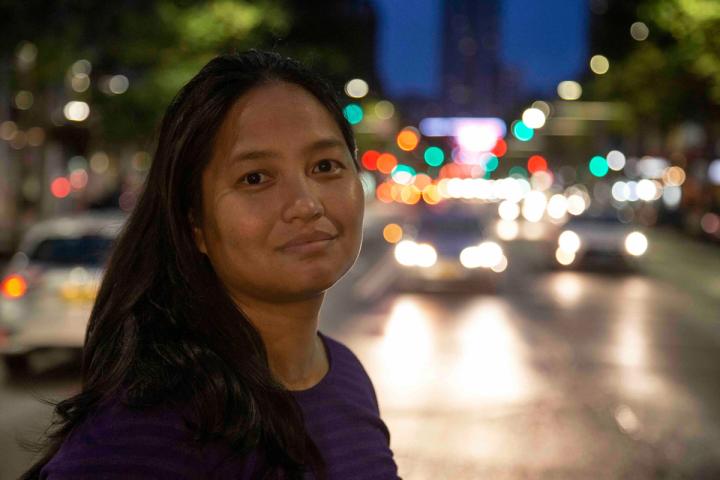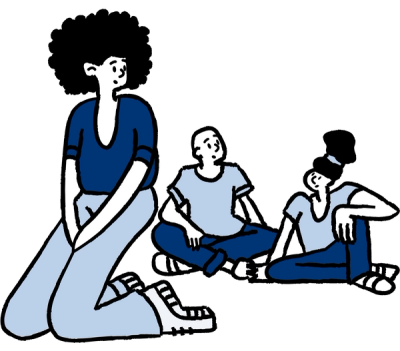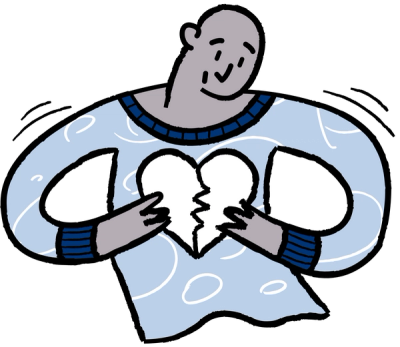As a teenager in a small country town, Jai felt isolated, unsure where to turn, and burdened by struggles that seemed too heavy to carry alone. One call to Lifeline changed everything - offering safety, validation, and the reminder that she wasn’t alone. From those early moments of reaching out in a phone box, through experiences of homelessness and hardship, Jai discovered resilience, the power of support, and the importance of creating her own toolkit for managing mental health.
Listen here
Read the transcript
Jai (Guest):
[00:00:00] For the person on the other end of the line to take that time and give me the space to express myself, yes, I think that was really, really important for me. It made me feel safe.
Announcer:
[00:00:13] Welcome to Holding on to Hope, a series that shares the stories of everyday Australians that have experienced moments in crisis and found a path to support. Whilst all of the stories shared offer hope and inspiration, at times you may hear something you find triggering.
[00:00:29] If you or someone you know needs crisis support, please phone Lifeline on 13 11 14, text 0477 13 11 14, or visit lifeline.org.au for Lifeline chat service, which is 24 seven.
Carla (Host):
[00:00:45] Hi, I'm Carla and welcome to this episode of Holding on to Hope.
[00:00:50] Jai first called Lifeline as a teenager from a phone box, feeling lost and unsure where to turn.
[00:00:57] Growing up in a small town, help wasn't always accessible, but that call gave her something invaluable, validation and support.
[00:01:05] It became a lifeline through some of her darkest moments from early struggles with depression to later experiences of homelessness and suicidal thoughts.
[00:01:16] Today, Jai's mental health is stable and she's learned to recognise warning signs and seek support when needed.
[00:01:22] She's here to share her journey, the role Lifeline played in it and why reaching out can be life changing.
[00:01:29] Okay, let's go back, Jai, a bit in time. Can you share about what was going on in your world early on?
Jai (Guest):
[00:01:35] Well, I was about 14. I was living in a country town in South Australia and at that age I was an angsty teenager.
[00:01:45] Lots of teenagers are angsty, yeah.
[00:01:48] That's right. So I was young and feeling very, very isolated. And being of Asian descent, there weren't many people like me. That's how I felt.
[00:02:02] It felt like I'd been expelled from my teenage group.
[00:02:06] Which, looking back now, I feel really, really sad for that young person that I was.
[00:02:13] At that time, there was a few things going on in the family home as well, which just weren't nice.
[00:02:21] I just didn't know what to do. I didn't know who I could talk to and I genuinely didn't know what to do.
Carla (Host):
[00:02:31] Yeah, it sounds very much like you described, an isolated existence and those teenage friendships can be intense and then destroying as well.
Jai (Guest):
[00:02:43] Yes, yeah, that's very much what it was. And, you know, something had to change. I had to do something to shift where my head was.
Carla (Host):
[00:02:54] So feeling like that as a 14-year-old and being in a small country town, what was it like? What were the barriers or opportunities to finding some support for mental health?
Jai (Guest):
[00:03:07] Well, initially I didn't know where to turn. And then when I started to think about it, I thought, well, everyone's going to know or someone's going to know someone who's going to find out.
[00:03:19] And, you know, everyone knows everyone. So whether you go to see a doctor, whether you end up going to the hospital, whether you go to family services, someone knows somebody.
[00:03:30] So I didn't know how safe I was going to be. My mother was a school teacher.
[00:03:38] So who do I talk to to remain anonymous? I really didn't know. And I couldn't just walk myself to a hospital as a child. You can't do that.
Carla (Host):
[00:03:54] So very limited options for you.
[00:03:57] Being so young, 14, finding that phone box, seeing the ad or the number for Lifeline, that's an incredible moment for a young person to take that responsibility of themselves into their own hands and make the call.
[00:04:13] Can you remember the phone call itself? What happened and what you talked about?
Jai (Guest):
[00:04:18] I think it was rather innocent in a way. It was really just me ringing up some of the very basic, hello, how are you? What's your name? Are you OK? You can't forget that tagline.
[00:04:36] And me simply, no, what's wrong? You know, and for me, it was like, I don't know what to do. I can't handle this.
[00:04:43] That led on to some basic safety checking and realizing that I am actually very young, you know, and then finding out that there was also Kids Helpline.
[00:04:56] So something that was sort of very real for me at that time was that I was in a country town.
[00:05:02] So there wasn't a lot of mental health services at that time in the 90s.
[00:05:08] So, you know, I guess, you know, for the next couple of years, I sort of danced around Lifeline, Kids Helpline and a little bit of child mental health.
[00:05:21] And that sort of, they were the three main resources and the school counsellor.
[00:05:27] That's pretty much what I relied on.
Carla (Host):
[00:05:29] Yeah. Thinking about that first call to Lifeline, what was it that made a lasting impact on you that allowed you to use Lifeline for the next while?
Jai (Guest):
[00:05:40] I remember not feeling judged for my thoughts and feeling heard for the person on the other end of the line to take that time and give me the space to express myself with the words that I had.
Carla (Host):
[00:06:03] Yeah. Being so young, not even having the language to explain or express what's going on for you.
Jai (Guest):
[00:06:10] Yes. I think that was really, really important for me. It made me feel safe.
[00:06:15] It encouraged me to know that that was a space that I could reach out to again if I needed to, because I knew then that they would take the time.
[00:06:27] They wouldn't dismiss me and that they would listen carefully.
[00:06:35] They would, you know, in all my jumble of young person words and life, that they would be able to extract what I needed.
Carla (Host):
[00:06:46] After high school, you moved from your small country town to Adelaide and then to Sydney.
[00:06:53] As a young person, what was going on for you? What was your world like?
Jai (Guest):
[00:06:59] I actually came to Sydney with the intent to die, which is quite serious.
[00:07:05] Clearly, that didn't happen. And I'm very thankful for that.
[00:07:11] And once I realised that, my thought was, how do I continue? How do I survive? What do I do?
[00:07:19] And a family friend who was a social worker actually worked at a hospital.
[00:07:25] So young Jay walked us off to a hospital.
[00:07:30] And we now know that hospitals are well aware of mental health.
[00:07:35] So that sort of threw me into the, into the adult mental health services and also into homeless services.
[00:07:46] So I pretty much immediately got thrown into all of that sort of homelessness services and mental health services, which, um, at that time in terms of mental health, it wasn't really like outpatient or anything.
[00:08:03] It was just sort of checking up, are you okay? Sort of quite limited, which is fair.
[00:08:10] And then the normal homeless services of trying to get you accommodation, which is generally just overnight. Occasionally you get a week or two. Being younger, I was still able to get some new health services, which was an absolute bonus. But then of course there were also some of my basic needs that I was obviously trying to get, like getting food, clothing, getting a shower, um, still had Centrelink. So I obviously had to meet my obligations there and all of those things take time and energy.
[00:08:47] And when you're homeless, that is a lot on its own. And that at a very basic level affects your mental health, which is why I say that if you don't have a mental health problem before homelessness, you're very likely to in the midst of homelessness.
[00:09:05] And I knew nobody in Sydney, but I did have a number.
[00:09:13] And that was so, so important for me in surviving.
Carla (Host):
[00:09:18] That's amazing to have that, that transportation across the country, that one number
[00:09:26] followed you, or you were able to follow it across the country.
[00:09:31] You mentioned feeling, having thoughts of suicide and having insecure housing.
[00:09:37] How is this combining and impacting you on the day-to-day experience?
Jai (Guest):
[00:09:42] When you're at that level of distress, sometimes all you can do is get through until another service is available, until another ear is there to listen to you. People will often think, well, see a doctor, go to an agency, do all of these things. They're there, and they are
[00:10:05] accessible, but they are sometimes time limited and they often have business hours.
[00:10:13] And life is not limited to business hours. Mental health is not limited to those business hours.
[00:10:20] And then when you're homeless, services have business hours. They might have extended hours, but they still have times when people have to go home and the doors close. But you're still homeless.
[00:10:35] You're still in distress. So what else does someone do? And if that means I pick up the phone and speak to someone at two o'clock and they can give me something so that I stay, stay where I am, even in that under that tree or whatever it is on that bench until six o'clock so I can walk myself to somewhere else. That's what it takes.
Carla (Host):
[00:10:59] You've painted such a vivid picture of these experiences for you.
[00:11:05] And I wanted to ask a bit more about how Lifeline continued to be playing a role in these experiences as you've moved into navigating really complex situations and mental health issues on top of that. What was, what did Lifeline, how did it work for you?
Jai (Guest):
[00:11:22] There have been times where I have I've needed someone simply to listen. So in the isolation of feeling like there's nobody else.
[00:11:36] So essentially when I've, doors have closed and I've just felt like there's nobody else there and I really just need to talk it through. Often there's a lot going on in my head and I just need to tease it out and make sense of all of that. You know, writing is great but sometimes, you know, to sound it off with someone else and just say, am I, am I thinking about this right? Am I, is this logical? So to ring somebody who has some, some skills that's, that's not just
Carla (Host):
[00:12:09] listening, that can be really, really important. And you've also used the phone line of Lifeline, but also the, the text and chat services. Yes. What's that technology been like for you?
Jai (Guest):
[00:12:22] That's been a really big step up for me. It's relatively new. But for me, I actually have a hearing disability. So I've really appreciated being able to have the visual input. So there are times where I can't always hear accurately what's going on and I would prefer to have my phone on loudspeaker,
[00:12:50] which is not appropriate in most settings. So to have it do a text or even the chat, online chatting, is actually really, really good for me. It's really useful. The other thing that it does for me is it actually gives me, it forces me to think before I speak, which is an interesting strategy.
Carla (Host):
[00:13:16] Yeah. Quite a change from the verbal.
Jai (Guest):
Yes. So from a mental health perspective, from that impulsive perspective, it's actually an interesting technique to use for me. I've actually, it's only on reflection that I've thought, hey, that's a good technique. When I'm feeling that urge with my mental health, that reactiveness, to be forced to pause before I speak, that's one
[00:13:47] way that works. The other thing also on another side, so that's often when I'm elevated, but then there's times when I'm very flat and apathetic, but I know I need to reach out, but I don't necessarily want to talk. So that's another time where chatting can be useful.
Announcer:
[00:14:07] We hope you're enjoying this episode. Lifeline's new support toolkit makes it easier to care for family, friends and loved ones, and look after yourself along the way. Visit us at toolkit.lifeline.org.au. Now back to the episode.
Carla (Host):
[00:14:21] You've been managing your mental health for a long time, and you've obviously developed some strategies and techniques. What's working for you? What have you changed over the years? What have you learned through your journey?
Jai (Guest):
[00:14:34] Some of the things I've learnt would be to have a bit of perspective in where I am, being able to look to the past, and it doesn't have to be a long way past. It can just be from last week, it can be to yesterday even, and then even to looking forward. Even if it's looking to an hour, thinking, 'I'm having dinner in an hour, if that's what it's going to be to carry me.'
[00:15:04] But then the other thing is having the crisis management plan. I think we all have management plans as parents. I know parents have management plans. We all have management plans when things go wrong. We have next of kin, medical next of kins. That's a management plan.
[00:15:25] You know, businesses have management plans. So, you know, it's a life management plan, you know, and crisis is just a step up. And they can be things like, I still have my hospital bag, oops, but that's okay. In that I have a little box, and it's got a couple of tea bags. It's got some lollies in there. It's got a list of phone numbers. It's got a photo of my dog in there.
[00:15:52] You know what I mean? So sometimes it's just very, very practical, material things.
[00:15:59] I think it's just important to sort of think about not just the present practical things, but also, you know, have a whole range of things in your toolbox. And to know that yours doesn't have to look like someone else's. You know yourself. If you want to listen to heavy metal music, go for it. Go for it. Exactly. If you want to pat your cat, and your cat lets you, then that's what works for you. You need to give yourself grace.
[00:16:32] You know, you need to, to respect yourself enough that if you're not going to get up at seven o'clock and go for that walk, even though that's on your little management plan, that's not going to happen.
[00:16:48] It's okay. And you don't need to beat yourself up for that.
Carla (Host):
[00:16:52] That's a lovely term. Let yourself have some grace or give yourself some grace.
[00:16:57] So Jay, how are you feeling about your mental health today?
Jai (Guest):
[00:16:59] You know, I've had an incredible six months that I never thought would happen.
[00:17:05] I honestly didn't think that I would get to the age that I am.
[00:17:10] You know, I've gone to the US. I've actually spoken at the United Nations.
[00:17:15] You know what I mean? And then I've, I've gone back to my home country, which I didn't think would happen.
[00:17:21] At one point I thought, oh, if I ever go to Thailand, you know, I'll do it.
[00:17:25] And then that'll be the end of my life.
[00:17:27] But I don't feel like that anymore.
[00:17:29] You know, I've done it and it's wonderful and my life continues.
[00:17:33] I'm not necessarily buzzing, but I feel good and I feel able to continue my life.
[00:17:39] You know, it's not the end and I'm not necessarily buzzing.
[00:17:42] It just continues on.
[00:17:44] And that's what to me is what stability is.
[00:17:46] I feel pretty good about how I manage my mental health.
[00:17:52] I have a lot of practices, I guess, that I use to keep tabs on it.
[00:17:57] Things that I check in with myself, check in with people.
[00:18:01] I tend to be quite real about, about my wellness.
[00:18:05] I know that I won't necessarily be at a 10 or a 9 and not all the time.
[00:18:16] And I'm okay with, with that.
[00:18:18] And I also know that, uh, two or three doesn't have to be a disaster.
[00:18:25] I mean, maybe if it is for a week, but, you know, to go down to a 2 doesn't necessarily mean depression.
[00:18:33] And to go up to a 9 doesn't have to be mania.
[00:18:36] I mean, I was at a 9 in New York.
[00:18:39] Of course I was.
[00:18:40] You know, but when someone dies, of course I'm going to be at a 2.
[00:18:43] So to put things in perspective.
[00:18:45] So I've learned to sort of think, okay, what's going on?
[00:18:49] 'Yeah, okay, that makes sense.'
[00:18:50] And to allow myself to feel the feeling, and maybe sometimes I'm putting some boundaries on it.
[00:18:58] 'I'm going to feel this way. It's all right.'
[00:19:00] I can feel angry for a while, but how am I going to feel angry?
[00:19:04] I'm not going to take it out on myself.
[00:19:06] I'm not going to take it out on someone else, but I am going to feel angry because I have every right to feel angry.
Carla (Host):
[00:19:12] That's really interesting.
[00:19:13] Both the monitoring and then, 'how am I going to feel it?'
[00:19:17] 'How am I going to express it?'
[00:19:19] That's a really useful technique, I think.
Jai (Guest):
[00:19:21] Yeah, that's a really big one that I have learned fairly recently is the 'how?'
[00:19:27] I've got some people in my life that express their feelings in ways that's like, 'I don't know if that's the best way you want to be doing it right now' or whether it's self-harm, which I still have urges and I have urges, but are those urges going to get to something else?
[00:19:47] And I know that now.
[00:19:48] I know that in myself now.
[00:19:50] So, you know, so that's my monitoring that, if it gets to something else, I have my little list of, 'okay, if it gets to this, I'm going to reach out to this person.'
[00:19:59] 'If it gets to this, maybe I need to get an Uber.'
Carla (Host):
[00:20:03] That's really, it puts it in such a nice package to say, this is still something you're working on.
[00:20:10] It's still something that might change over time as well as other strategies come up for you that work.
Jai (Guest):
[00:20:15] And that's exactly it.
[00:20:16] That strategies may have a time and space.
[00:20:21] You know, I don't need to use strategies that I have used in the past.
[00:20:25] And I can learn new strategies.
[00:20:28] And that's a really cool thing.
[00:20:30] As we grow, we can add to our toolkit.
[00:20:33] We can do an inventory.
[00:20:35] We can work out what we need and what we don't need anymore.
Carla (Host):
[00:20:39] What would you say to the 14-year-old outside the phone box, or the young woman who moved across the country with those thoughts of not living, sitting here now some years later, what would you say to those young people?
Jai (Guest):
[00:20:55] Keep fighting that stubborn, angry, frustrated person.
[00:21:04] Use that energy.
[00:21:06] Use it to fuel the fight to keep going.
Carla (Host):
[00:21:12] And if we have listeners, viewers who are hesitant to reach out, what would you encourage?
[00:21:18] What would you say to encourage them to take that first step?
Jai (Guest):
[00:21:21] Again, that energy that's causing the distress is still energy.
[00:21:28] And you can use it in whatever way that you want to.
[00:21:31] And you can use it to reach out.
[00:21:35] And that reaching out could be to anyone, or I dare say anything, because it could also be an animal or plants and nature.
[00:21:45] So trust in reaching out.
[00:21:49] And you might find that you're reaching out to someone else who's struggling, and you'll have something in common.
[00:21:55] You might find that you're reaching out to someone else who has a resource that can help you, that you don't know about.
[00:22:01] They might offer to babysit for you so you can get a night's sleep.
[00:22:04] Or they might cook you a meal.
[00:22:07] Or they might drive you to an appointment.
[00:22:09] Or they might just say, 'yeah, I'm here for you.'
Carla (Host):
[00:22:12] What message would you like to leave with listeners, viewers who might be struggling with their mental health right now?
Jai (Guest):
[00:22:20] In my journey in life, all of it, I have found that mental health and struggles in life does not discriminate for anybody.
[00:22:32] So anyone can have struggles with addiction and mental health.
[00:22:39] Anyone can succumb to homelessness.
[00:22:44] And then anyone can come through the other side
[00:22:48] and see some light and see some hope.
Carla (Host):
[00:22:50] That's wonderful.
[00:22:52] You're speaking to everyone there.
[00:22:54] I mean, that's such an inclusive statement.
[00:22:57] It doesn't matter your background or your age or your gender or your culture.
[00:23:02] Mental health affects many people across all of those categories.
Jai (Guest):
[00:23:07] That's right.
[00:23:08] And the thing is that I've only recently realised that some people probably won't even think of it as mental health.
[00:23:15] They might not want to name it as that.
[00:23:17] They might just think, 'I've been sleeping much for the last six weeks.'
[00:23:22] Okay, you don't want to call it insomnia.
[00:23:25] Whatever you want to call it, you can call it scared instead of anxiety.
[00:23:30] That's okay.
[00:23:31] If you're just having a hard time, lots of people have a hard time.
Announcer:
[00:23:38] Thanks for listening to Holding On To Hope, the podcast.
[00:23:42] Lifeline is grateful to all Holding On To Hope participants for choosing to share their personal lived experiences openly and courageously in order to offer hope and inspiration to others.
[00:23:53] Your act of kindness makes for a better world.
[00:23:55] And remember, you can call Lifeline at any time on 13 11 14.





